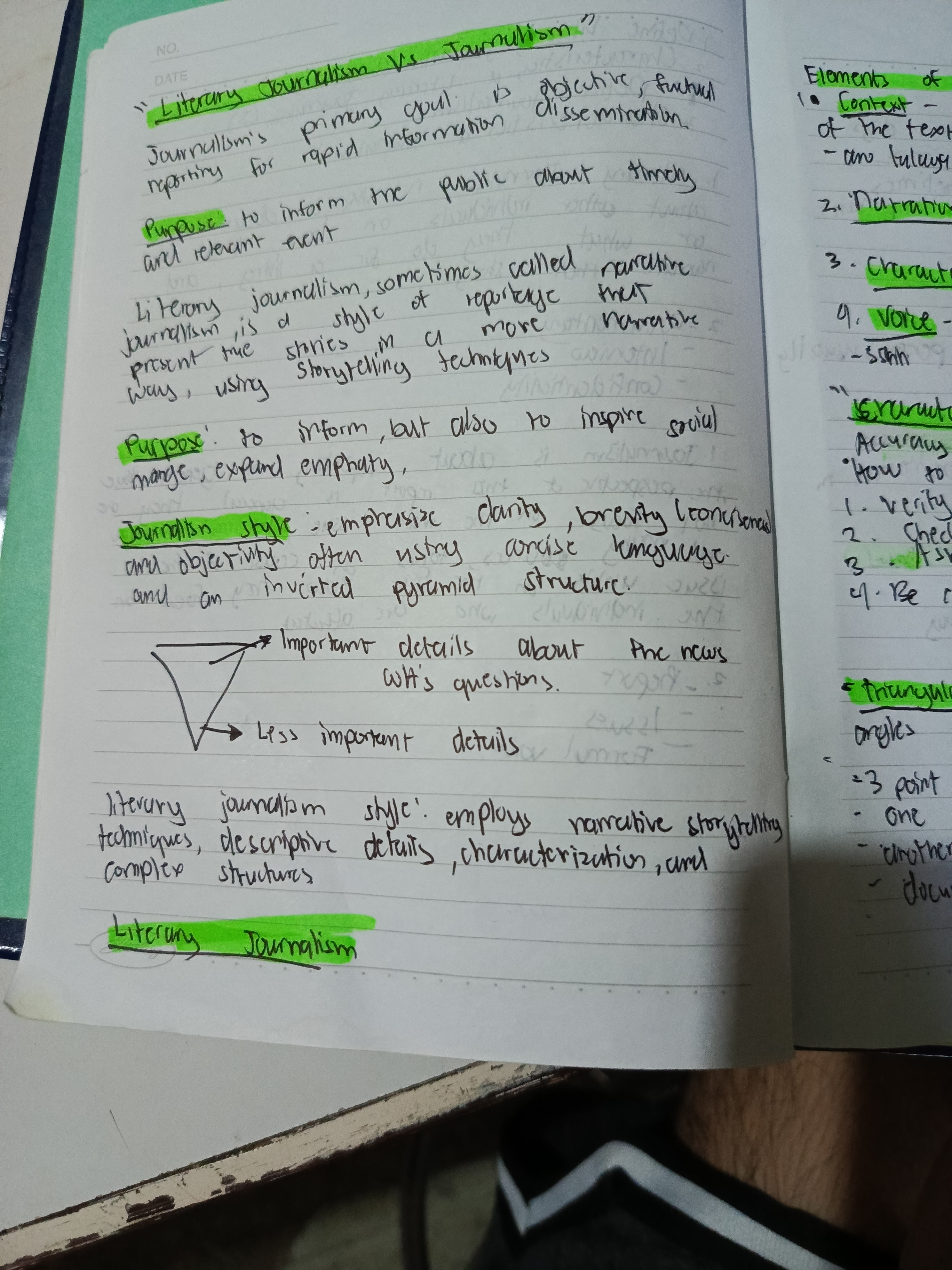Creative non-fiction
1/49
There's no tags or description
Looks like no tags are added yet.
Name | Mastery | Learn | Test | Matching | Spaced | Call with Kai |
|---|
No study sessions yet.
50 Terms
Autobiography and biography
Humans naturally have the desire to leave a legacy. Own life story.
Nature of writing a biography
Third person perspective.
Formal tone.
Past tense .
Chronological order of detail.
Formal tone
Professional respectful and objective.
Nature of writing autobiography
First person perspective.
Me exhibit of sense of subjectivity.
Informal tone and is a conversational for the readers.
Reading in an anecdotal style.
Feelings emotions and realization of the writer are included.
Elements of an autobiography
Setting.
Characters.
Chronology.
Details.
Author's purpose.
Background.
Biography
Factual evidence.
Chronology.
Setting
Time,place
Characters
Real life people
Chronology
Sequence of events
Details
Objective
Author's purpose
Helps readers understand
Factual evidence
Facts and information
Chronology
Childhood to now
Elements of literary journalism
Character development.
Voice.
Character development
Helps present values and experiences based on the people behavior actions or interaction.
Voice
Is crucial on the writers part since it will dictate whether the tone in the way the text is written release or not it's readers.
Characteristics of literary journalism
Immersion reporting.
Accuracy.
Subjectivity.
Documentary.
Interview.
Confidentiality.
Immersion reporting
Allows the writers to leave how the subject lives and reflects this living experience in the text.
Join with there to experience.
Accuracy
Insurance the fact checking and notification of information play a significant role in the writing process.
Subjectivity
Implies the readers may give different interpretation of the writers intention and stories .
Different interpretation or understanding.
Types of literary journalism
Investigative feature.
Profile.
Human interest story.
Lifestyle and travel story.
Investigative feature
Resembles news gathering but it more elaborate and includes characteristics of typically feature article.
Missing sabunggero.
Profile
A written portrait of a person usually published as an article or news.
Human interest story
A future store that present stories of people or animals in an emotional way. Some call this soft news as it fact base but games to rouse emotions.
Lifestyle and travel story
An article that presents the good and positive ways a person lives his or her life as well the travel stories that involves food culture sceneries and showcasing The place visited
Elements of reportage
Historical background in casuality.
Material citations.
Literary writing style.
Historical background in casuality
This gives reader a foundational understanding of the subjects social or cultural context .
Material citation
It is a must to present Readers with materials and sources that will make them better understanding the basis of all the text content.
Literary writing styles
Reportage also uses narrative styles from fictional writing as this styles make at the content even more captivating to more readers.
Characteristics of reportage
Clarity.
Dynamism.
Informativeness.
Clarity
It's reflected the accurate and clear use of descriptions that appeal to senses.
Dynamism
Is the variety in terms of of the plot and overall story presented a text is a dynamic when it can offer a story that is common to all battery represented in a different way.
Informativeness
Integrates the purpose of reportage as a source of information and technology.
Define literary journalism
is like a documentary about other individuals on how they live or what they do for a living and narrative their story.
Define journalism
is an about reporting on a general issue the perspective of this report is general they are not focused on the main issue minimal interview and many sources focus on cause of the issue unlike on the first video they focus on the individuals who are affected p.
Characteristics of journalism
Report.
Issues.
Formal voice.
Journalism
Primary goal is objective factual reporting for rapid information dissemination.
Purpose of journalism
To inform the public about timely and relevant event
Literary journalism
Sometimes called narrative journalism is a style of reportage that present true stories in a more narrative way using storytelling techniques.
Purpose of literary journalism
To inform but also inspire social change expand empathy
Journalism style
Emphasize clarity brevity conciseness and objectivity of the new thing concise language and an inverted pyramid structure

Literary journalism style
Employees narrative storytelling techniques descriptive details characterization and complex structures.
Elements of literary journalism
Context.
Narration.
Character development.
Voice.
Context
Reverse the setting or background of the text.
Narration
Storytelling
Character development
Experiences
Voice
Dictate whether the tone
How to do facts checking
Verify names dates and place.
Check official records or documents.
Ask the source directly.
Be cautious online.
Triangulation
Checking information from different angles or source to be sure it's true.
Three point of triangulation
One source.
Second source.
Documents and records.